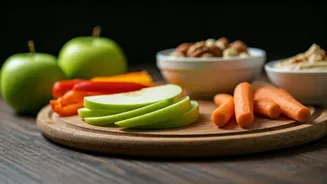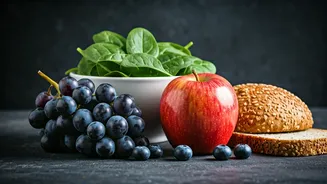Why Healthy Snacking?
Incorporating healthy snacks into your routine offers numerous benefits. It aids in maintaining stable energy levels throughout the day, preventing the drastic
highs and lows associated with consuming sugary or processed snacks. Moreover, smart snacking helps control hunger, making it easier to manage overall calorie intake and support weight management goals. Healthy snacks also provide essential nutrients, such as vitamins, minerals, and fiber, contributing to improved health and well-being. By choosing wholesome options, you can reduce your intake of unhealthy fats, added sugars, and sodium, thereby supporting heart health, digestive function, and overall vitality. Consistent healthy snacking fosters a positive relationship with food, encouraging mindful eating habits that benefit both physical and mental health. Consider the impact on your children too; giving them healthy snacks can establish healthy eating habits that benefit them for the long term.
Fruit & Veggie Combos
Embrace the natural goodness of fruits and vegetables in your snacks. Create colorful and appealing combinations that provide essential vitamins and minerals. Think of apple slices paired with almond butter, offering a blend of natural sugars and healthy fats. Another great option is a handful of berries—strawberries, blueberries, raspberries—providing antioxidants. Vegetable sticks such as carrots, celery, and cucumber alongside hummus deliver fiber and a satisfying crunch. Consider making a fruit salad with a variety of seasonal fruits for a refreshing treat. A quick, easy, and healthy snack consists of a banana sliced into small pieces, mixed with a spoonful of peanut butter and a sprinkle of cinnamon. By focusing on whole, unprocessed foods, you not only nourish your body, but you also instill good eating habits.
Nut and Seed Mixes
Nuts and seeds are excellent sources of protein, healthy fats, and fiber. Assemble your own trail mix with a combination of almonds, walnuts, pumpkin seeds, and sunflower seeds. Portion out small servings to avoid overeating, as nuts are calorie-dense. Adding dried fruits such as raisins or cranberries provides a touch of sweetness and additional nutrients. Be mindful of portion sizes; a small handful is usually enough to provide sustained energy without overdoing calories. Homemade trail mixes offer the advantage of controlling ingredients, allowing you to avoid added sugars, salts, and unhealthy oils often found in pre-packaged snacks. Consider using different nut varieties each time you make a mix to diversify your intake of nutrients. The goal is to create a well-balanced snack that satisfies hunger and supports overall health. This strategy is also useful for curbing cravings, as nuts and seeds provide a sense of satiety.
Dairy and Alternatives
Dairy or dairy alternatives provide calcium and protein. Yogurt, whether it is Greek or regular, offers probiotics that aid digestion. Pair it with berries and a sprinkle of granola for added flavor and texture. For those who are lactose intolerant or prefer a dairy-free option, soy yogurt, almond yogurt, and coconut yogurt are good alternatives. Ensure you choose unsweetened varieties to minimize added sugars. Cottage cheese, another high-protein option, can be enjoyed with sliced peaches or a drizzle of honey for a satisfying snack. Remember that dairy products also come with essential vitamins. Experiment with different combinations to find your favorite options. You might also want to explore dairy-free smoothies as a good snack alternative.
Homemade Energy Bites
Energy bites are a convenient and delicious way to get a quick energy boost, and are easily customizable. Combine rolled oats, nut butter, honey or maple syrup, and any extras like chia seeds, flaxseed, or chocolate chips. Mix all ingredients thoroughly and roll them into small balls. These bite-sized snacks provide a balance of complex carbohydrates, healthy fats, and protein, offering sustained energy. Energy bites are ideal for pre or post-workout fuel or as a mid-afternoon pick-me-up. They are also portable and easy to take with you. Store them in the refrigerator for the best texture and freshness. You can experiment with different flavors and ingredients to suit your taste, incorporating options like cocoa powder, coconut flakes, or dried fruit for variety.
Popcorn: A Healthy Choice
Popcorn, when prepared at home, can be a surprisingly healthy snack. Opt for air-popped popcorn, which is naturally low in calories and high in fiber. Avoid pre-packaged microwave popcorn, which often contains high levels of sodium, unhealthy fats, and artificial flavors. Season your popcorn lightly with nutritional yeast, herbs, or a small amount of sea salt. Air-popping is easy and requires no oil, making it a lower-calorie alternative to stove-top or microwave versions. Popcorn’s fiber content helps you feel full, making it a good snack for weight management. Always consider the portion size, as overconsumption can lead to consuming excess calories. Enjoy popcorn as a light, crunchy treat, avoiding heavy toppings such as butter or caramel sauce.
Planning and Preparation
Effective planning and preparation are crucial for maintaining healthy snacking habits. Take time at the beginning of the week to plan snacks, making a list of ingredients and preparing some snacks in advance. Pre-portion snacks into individual servings to avoid overeating. Keep healthy snacks visible and accessible in your pantry and refrigerator, reducing the temptation to reach for less nutritious options. Involve family members in the preparation process, making it a fun and interactive experience. Preparing in advance also helps manage your time efficiently during the busy week. Consider making a large batch of trail mix or energy bites on the weekend. Proper planning helps you stay consistent, even when you're busy or short on time.




















